For job seekers
For companies
For job seekers
For companies
Updated July 28, 2023 by Axel Grubba
Ready to find a remote job? Or expand your remote business?
Browse jobsOnly 39% of workers negotiate their salary when they’re offered a job.
Understandably, salaries and money, even in the context of job offers, can be a sensitive subject. But did you know that if you choose to give a counteroffer, you have a staggering 85% chance of success?
The rule of negotiating a salary is this: if you don’t ask, you won’t receive it. So if you feel like the salary on offer is on the lower side, feel free to draft a salary negotiation email and push your figures forward.
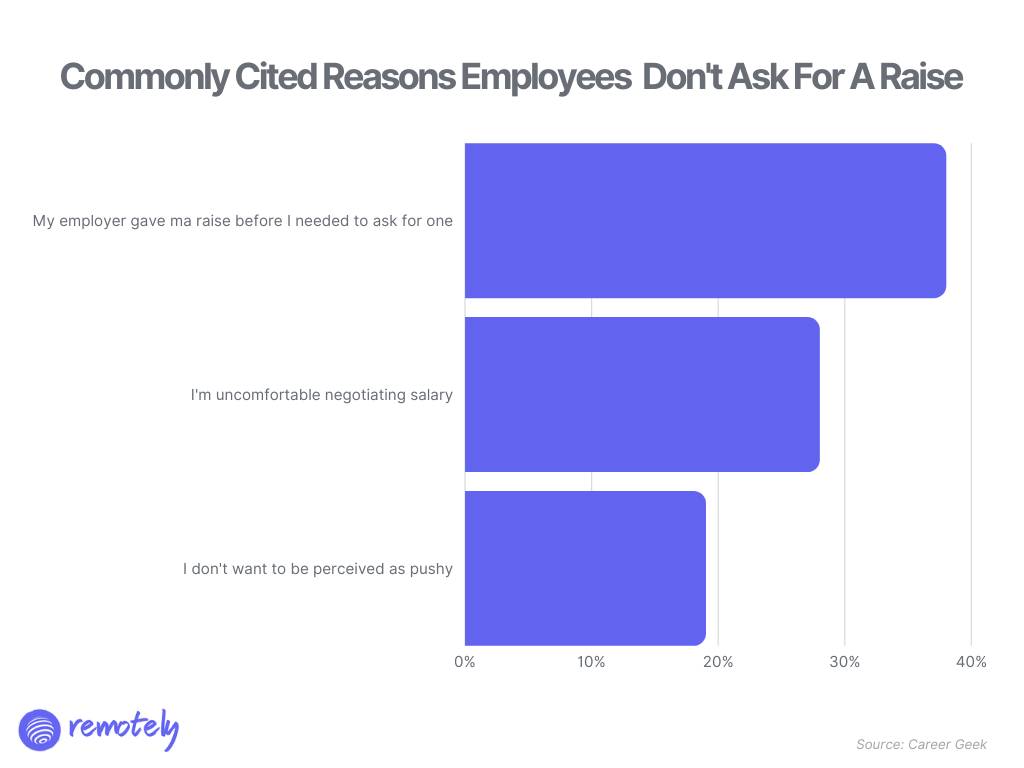 Source: CareerGeek
Source: CareerGeek
In this post, we’ll show you how to write a professional and compelling salary negotiation email that can help convince prospective employers to give you your target salary.
Receiving a concrete job offer after you’ve undergone several in-depth interviews and tests can be exciting. But if the figures on the job offer don’t meet your expectations, negotiating your salary is your next step. You can do this by sending a salary negotiation email.
A salary negotiation email allows you to discuss your desire for a higher salary with your potential or current employer. We recommend sending this email before onboarding after you have just received your job offer but haven’t signed it off yet. Though it is entirely possible to negotiate for an increase as a full employee as well.
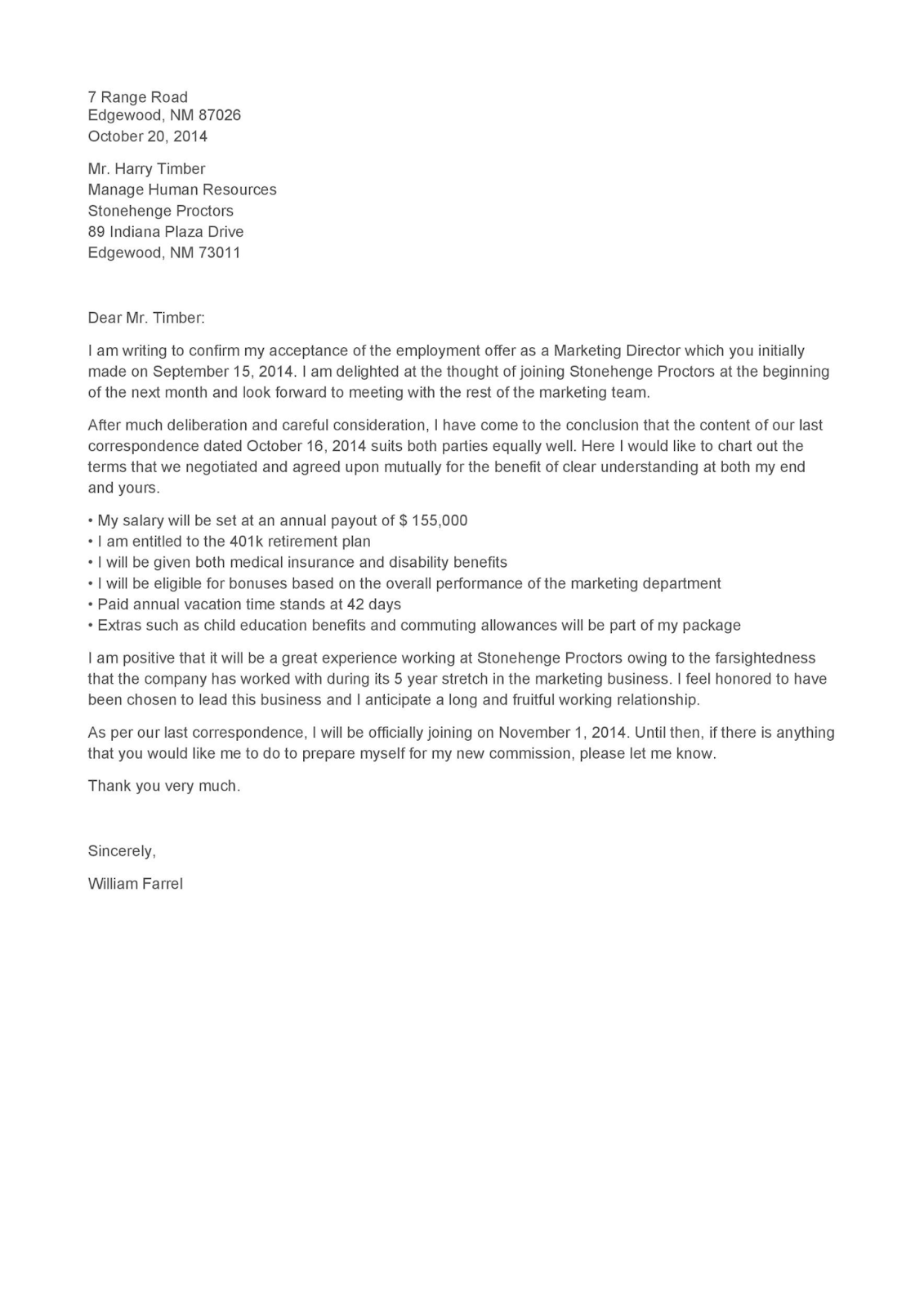
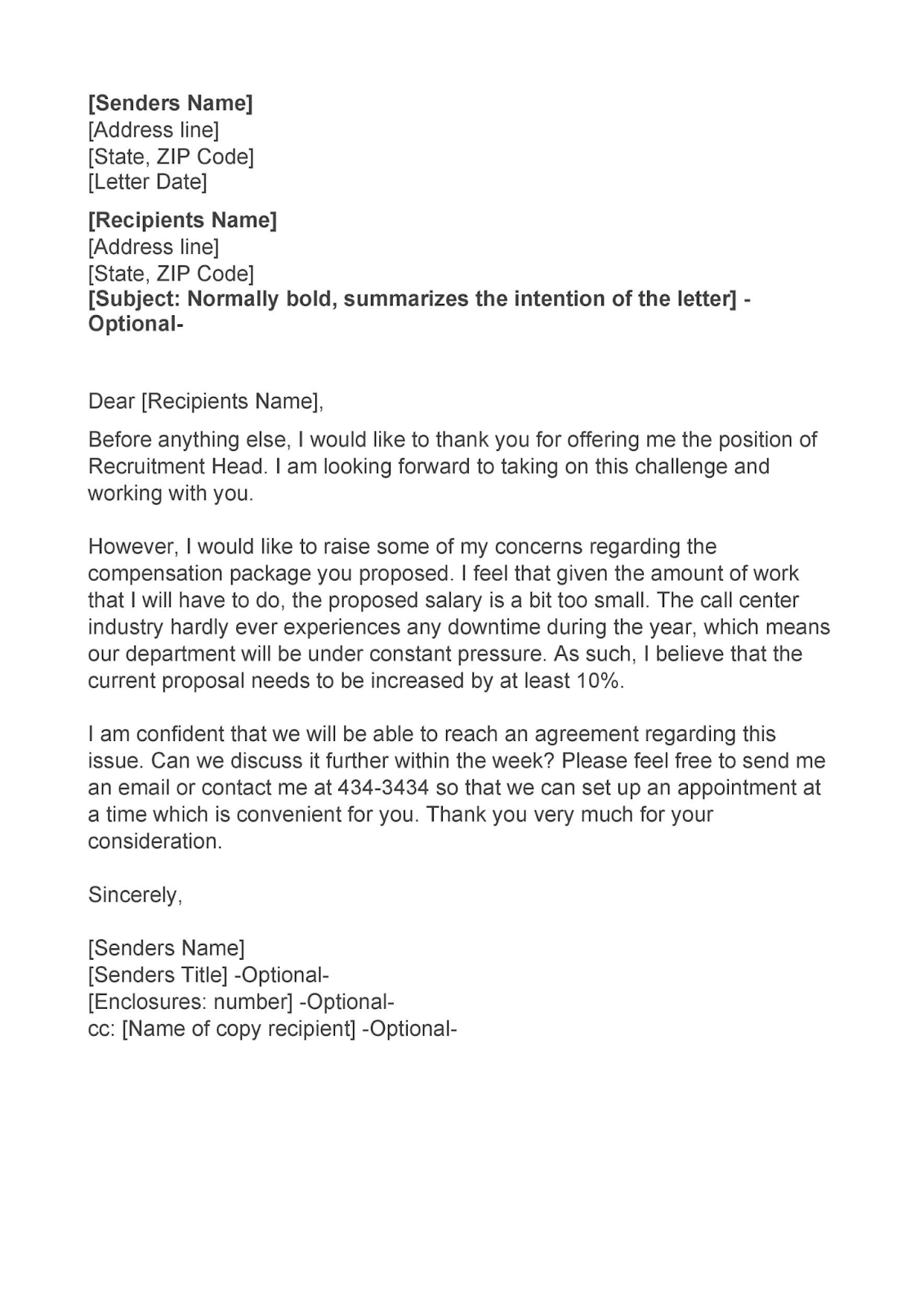
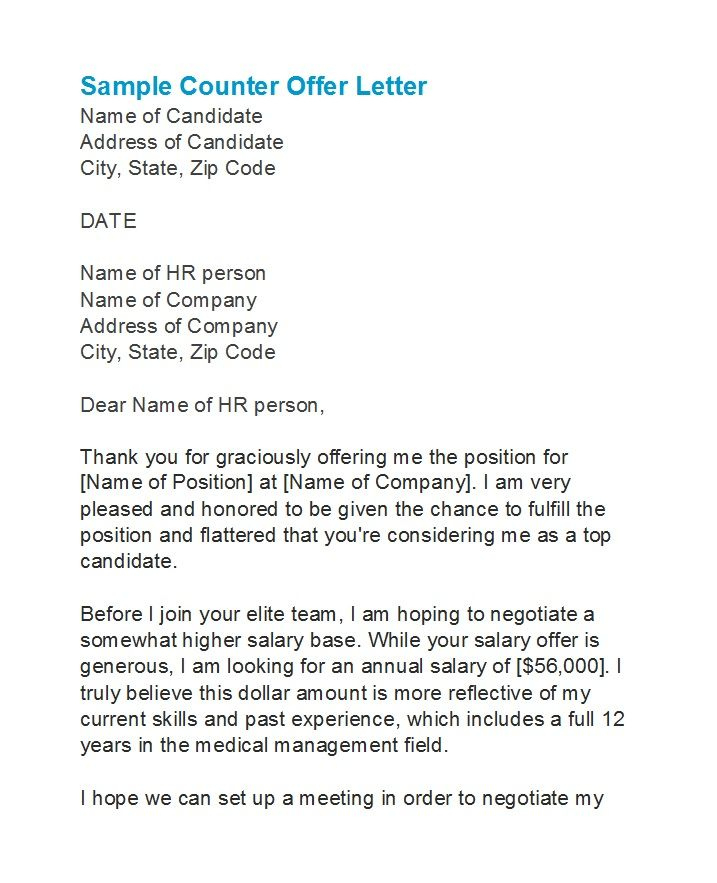
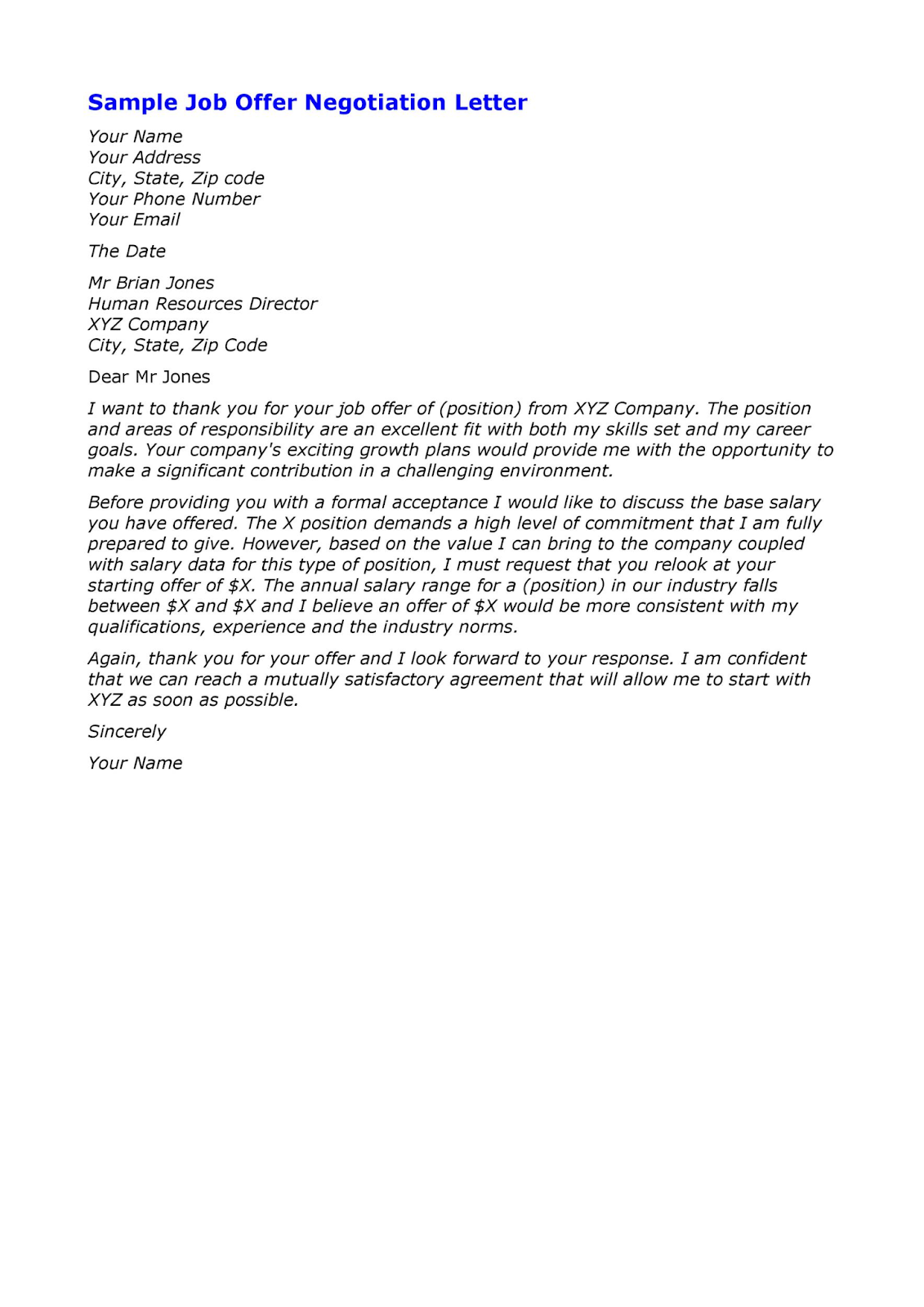
If you feel like the pay is too low relative to your level of experience, don’t be afraid to negotiate an amount that you think is fair. You’ve spent a lot of time earning all that work experience, building a credible portfolio, or training to be an expert in your field–make sure you’re getting compensated well for all that effort.
Don’t settle for a lower-than-expected offer without first sending them a counter-offer or a salary negotiation email, even if it’s a high-paying work-from-home job that’s incredibly sought-after right now.
If you’re looking for a high-paying remote job, Remotely is the best place to start your search. We connect professionals with the remote and hybrid jobs they need. Check Remotely’s job boards today!
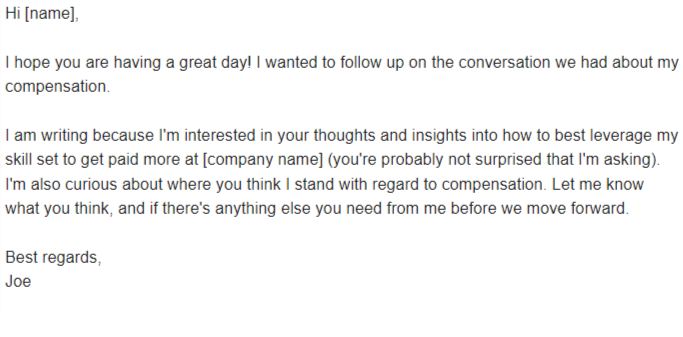
The thing that companies care the most about when they bring you in, is the value you bring to the organization. The more value you’re able to deliver, the higher your pay will be.
If your current salary doesn’t reflect the value that you bring to the organization, make sure to tell them that in your negotiation email.
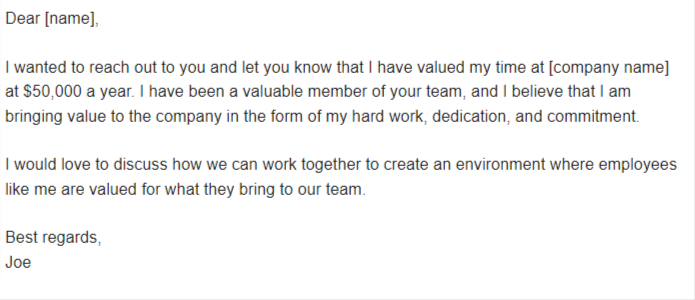
Say, you’re applying for a FAANG company, got through their rigorous recruitment pipeline, and got presented with a job offer. It might be worth sending a counter-offer if the salary falls short of your expectation.
Why? Because they can afford it.
The worst they can say to you is that the offered amount is their final offer. Recruiters won’t rescind your job offer outright for trying to negotiate if you do it in a respectful manner.
For those who have already accepted the job offer, you can still send a salary negotiation email during annual performance reviews. When your duties suddenly change (due to transfer, promotion, etc.), negotiating a salary adjustment, especially if your new duty involves more work, is acceptable.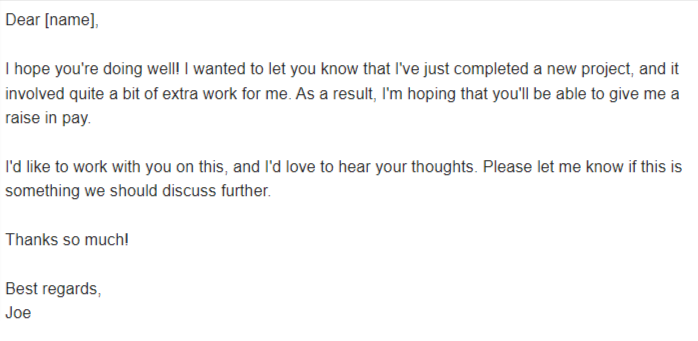
Most companies offer percentage-based pay raises each year. The higher your starting salary is, the higher your raises (and sometimes even bonuses) will be.
For example, let’s say you’re offered $60,000 with a 4% raise yearly. In five years, you’d make about $72,000.
If you managed to negotiate your initial salary to $70,000 straight from the get-go, in five years, you’d be making $84,000 instead. In other words, you’d get an extra $12,000 after five years if you negotiated, instead of accepting the original offer immediately.
A study notes that workers who ask for a higher salary are more satisfied with their job in general. That’s why if you feel like the salary printed on the job offer doesn’t meet your expectations, you have to speak up. If you accept the job as it is, you’ll feel less content and may resent the job in the long run.
Even when you’re offered a cushy remote or hybrid work-from-home job that gives you a lot of flexibility, it’s still not worth it if you feel dissatisfied or like you’re short-changed down the line.
Had a great project that year with superb results? Scored several high-profile clients? Completed all of the KPIs for the year? All of these are good reasons to ask for a raise. And a short salary negotiation email can act as a gentle reminder to employers of your value and contribution to the company.
When you write your email, write out all of your reasons for seeking a raise and include as much detail as possible. Use reviews, reports, charts, graphs, etc. — whatever that’s at your disposal to demonstrate your worth.
This can be an opportunity for your employer to review their opinion of you. And if you convince them of your worth, a pay raise or grant of extra benefits will surely follow!
The subject line for a salary negotiation email has to be clear and relevant. But here’s a tip: don’t directly mention salary in the subject. Money is always a sensitive subject, so don’t hit them with it immediately.
Instead, take a more diplomatic and indirect approach.
For example, here is a salary negotiation email sample with a very good subject line.
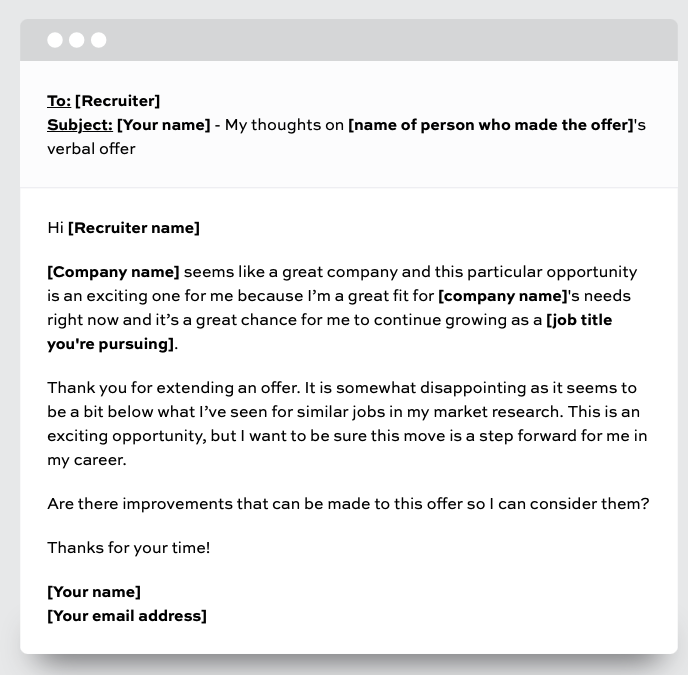
By phrasing the subject line as “My thoughts on [employer]’s verbal offer,” it doesn’t explicitly state that you’re trying to talk about salary. However, when written this way, the subject still implies that there are details in the offer that you want to discuss further.
The first thing the recipient will read will be the salutation, so while it’s a small detail, it’s important to get it right.
If you’ve rarely interacted with them before or your communication with them so far has mostly been formal, then use formal honorifics like “Mr./Ms./Mrs.”
However, if you have a rather informal relationship with the person you’re sending the email to, then you can address them by name (“Hello/Hi [First Name]”).
Start off on the right foot by expressing gratitude to the recipient for spending their time reading. If you’re negotiating based on a job offer, let them know that you appreciate their offer and are excited about the opportunity.
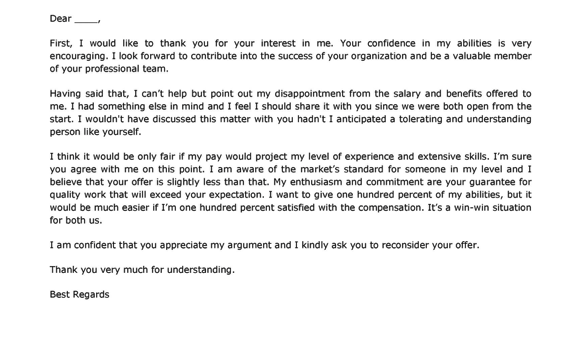
Once you’ve gotten the pleasantries out of the way, it’s time to get to business. You can start by acknowledging the initial amount they offered you and showing appreciation. Then, politely explain that you would like your salary to be increased and propose the amount you want.
Follow that up by listing all of the reasons why they should pay you more. Use as many relevant reasons as possible. Back up each point with data and figures if possible. They can make your email far more persuasive, like in the sample below.
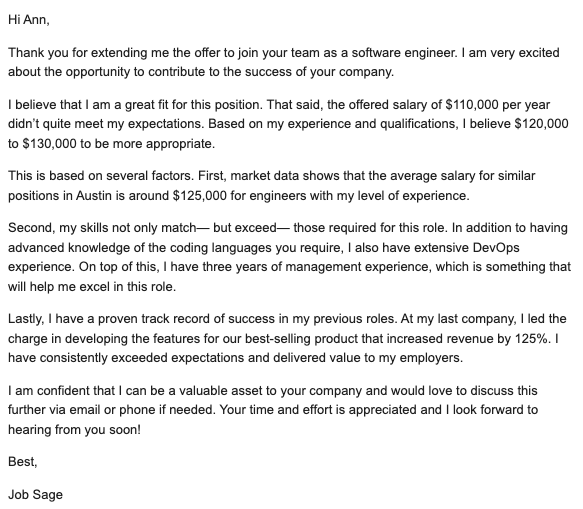
When you wrap up your salary negotiation over email, don’t forget to end it on a good note by adding another “Thank you” and a couple of words of gratitude to the recipient for spending time reading the email. And before you sign off, add that you look forward to hearing back from them, too.

Even if you already established a friendly relationship with the recipient, it’s still a good idea to keep the tone professional and as formal as possible in the email. You can use these three rules:
Never start the salary negotiation process without first knowing the exact amount that you want. It will provide the foundation on which you can negotiate with the employer.
To maximize your chance of success, you need to build a strong case for yourself from the get-go. Write down all of the relevant qualifications and achievements that you have. Next to each one, write a few brief sentences about how it sets you apart.
While writing your salary negotiation email, highlight each point and explain to the employer how these experiences you’ve had can benefit the company. This will help the company see how much you’re worth and why.
The negotiation process can take several rounds of emails (and even phone calls), back and forth. So, be prepared to fight for your ideal salary for a while.
However, it’s still important to know your limits. The process can frustrate you and the company if neither side gives in. So, if you feel like negotiation is going nowhere, you shouldn’t try to push the issue further. If you try and push, there’s a risk that the job offer will be rescinded entirely.
Mr./Ms./Mrs. [Name],
I’m very honored to have received your offer for the [job] position. I’m looking forward to joining the team and contributing my skills and knowledge to the [company name].
However, before I accept the offer, there are a few details that I would like to discuss with you. Particularly, the proposed salary for this position.
As I understand it, the proposed salary in the offer is [initial salary]. After researching the market and considering my experience, I am confident I could contribute more to the team with compensation more reflective of current industry standards.
During the interview, I stated how I have successfully led my team to complete [number of projects], which increased my previous company’s revenue by [XX%].
For this reason, a salary of [amount], or anywhere between [$XX] and [$YY], is more appropriate.
Can we revisit this later to work something out and reach a mutually beneficial agreement?
I’m excited about the opportunity and look forward to your response.
Sincerely,
[Your Name]
Commuting or even the idea of having a centralized office is a thing of the past for many people and companies in 2022. Instead, remote working — where you’ll do your job from home — has become the norm. The benefits of remote work for both employees and employers are many, from better productivity to better work-life balance.
Interested?
Visit Remotely’s job board today to browse hundreds of remote or hybrid working opportunities!